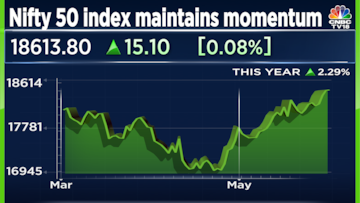
The performance of the Nifty index has been a mix of ups and downs in the past three years. In May 2020, during the challenging times of the COVID-19 pandemic, the Nifty hit a low point of around 7,500. However, since then, it has staged a smart recovery. By May 2021, the Nifty surged past 15,000, indicating a significant rebound. Throughout 2021, the index continued to climb, reaching new all-time highs.
Live TV
Loading...
However, in 2022, the market experienced increased volatility, with occasional corrections and sideways movements.

"The Nifty's current value stands at approximately 18,499, which reflects the market's response to various economic, political, and global factors during this period," said Kirti Agrawal, market analyst, F&O Trader and Educator.
Considering the recent performance, it appears that the Indian stock market is currently in a bull run, indicating a favourable market trend. As an investor, Agrawal said, it would be wise to stay invested, as there seems to be significant potential for further growth ahead.
"In fact, it is not far-fetched to anticipate that the Nifty may reach the 22,000 level within the next 2-3 years," she suggested.
However, when considering investment in equities, there are several factors to take into account.
Here are some important points to consider (compiled by Agrawal):
Long-term investment horizon
For individuals planning to invest for the long term, short-term market fluctuations may have less impact on the overall investment. Over time, markets tend to show growth, so a temporary expensive phase may balance out in the long run.
Individual company performance
Instead of focusing solely on the market as a whole, it's crucial to assess the performance and prospects of individual companies. Look for strong companies with solid fundamentals and growth potential.
Diversify investments
Spreading investments across different sectors and asset classes can help mitigate risks. By diversifying, investors can potentially offset losses in one area with gains in another.
Seek professional advice
Consulting with financial professionals who have expertise in the equity market can provide valuable insights and guidance. They can help individuals in navigating market conditions, evaluating investment opportunities, and aligning investments with goals.
"Additionally, it's important to remember that market conditions can change, and making informed decisions based on investment objectives is essential. Consider risk tolerance, financial goals and time horizon before making any investment decisions. Regularly reviewing portfolio and adjusting strategy as needed is also recommended," she told CNBC-TV18.
Importance of discipline
Discipline plays a pivotal role in stock market trading and equity investments, acting as the guiding force that steers traders through the unpredictable waters of financial markets.
"Embracing discipline means adhering to a set of established rules and principles, where strategies and price action take precedence over impulsive emotions. A disciplined trader remains aware of the risks involved and maintains a robust risk management plan. They set predetermined stop-loss levels and steadfastly stick to their trading plan without deviating from it," Agrawal said.
Stock recommendations
As per Agrawal, small-cap stocks present an attractive investment opportunity currently.
"When examining the Nifty Smallcap 100 and Nifty Smallcap 50, we observe that their PE ratios stand at 18.33 and 18.29, respectively. These figures indicate reasonable valuations, making small-cap stocks worth considering for investment," he said.
To identify good small-cap stocks, Agrawal added that it is crucial to focus on those with strong fundamentals. Conducting thorough research is key — considering factors such as financial performance, industry outlook, and management quality.
By assessing a company's financial statements, analysing its growth potential and evaluating its competitive position within the industry, one can gain valuable insights into its fundamental strength.
"Additionally, incorporating technical analysis can be beneficial in shortlisting potential investment opportunities. Technical analysis involves studying price patterns, volume trends, and other market indicators to gauge a stock's potential future performance. By combining fundamental analysis with technical analysis, one can identify small-cap stocks that may be well-positioned for growth," she added.
However, it's important to note that investing in small-cap stocks carries inherent risks. These stocks tend to be more volatile and can experience significant price fluctuations. Therefore, thorough due diligence and a diversified investment approach are crucial to manage risks effectively.
(Edited by : Shoma Bhattacharjee)
Check out our in-depth Market Coverage, Business News & get real-time Stock Market Updates on CNBC-TV18. Also, Watch our channels CNBC-TV18, CNBC Awaaz and CNBC Bajar Live on-the-go!


Prajwal Revanna's father in custody for alleged kidnapping and sexual abuse
May 4, 2024 7:53 PM
Delhi, Indore, Surat and Banswara — why these are the most challenging domains for Congress internally
May 4, 2024 1:53 PM
Congress nominee from Puri Lok Sabha seat withdraws, citing no funds from party
May 4, 2024 12:00 PM
Lok Sabha Polls '24 | Rahul Gandhi in Rae Bareli, why not Amethi
May 4, 2024 9:43 AM

